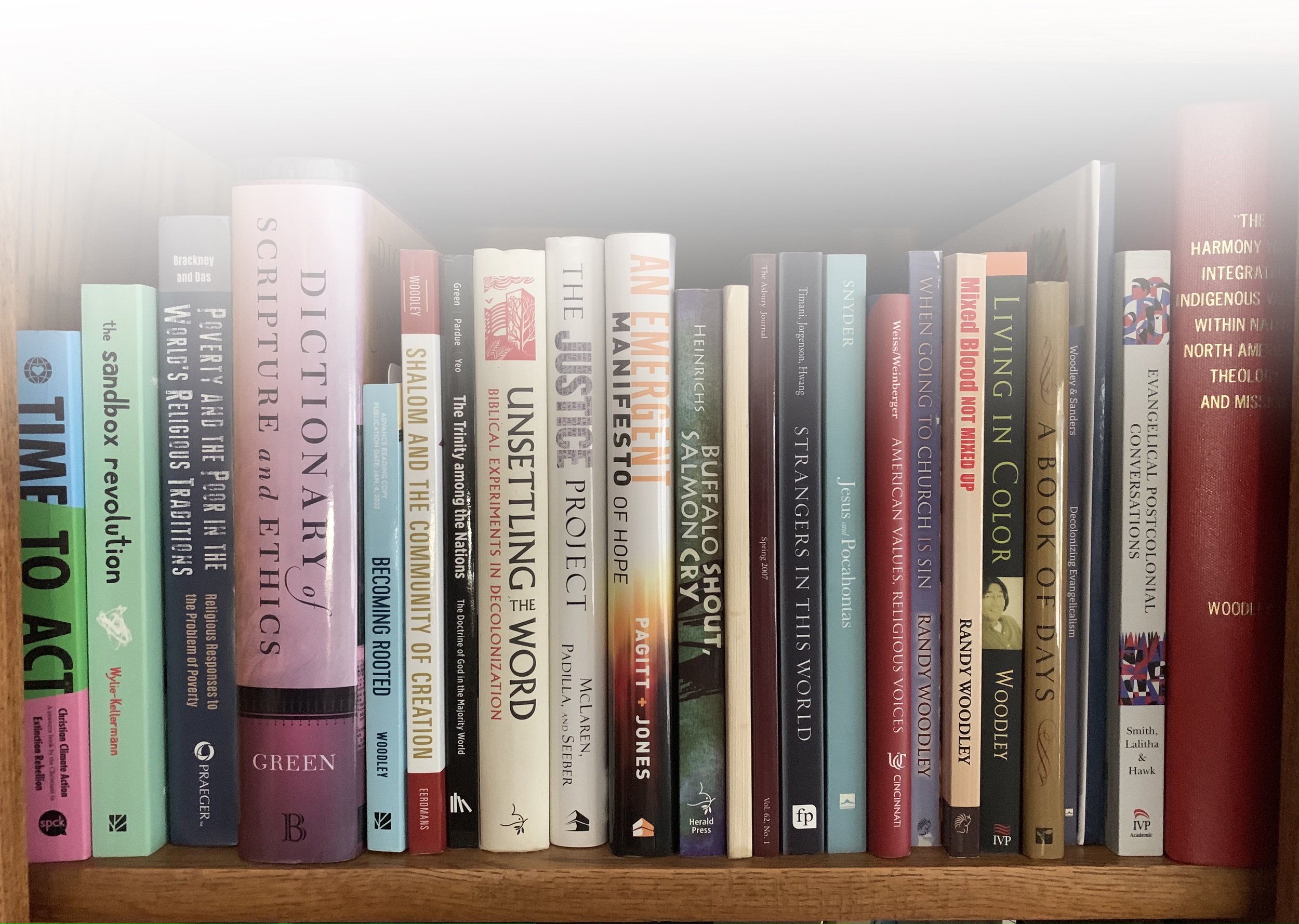
Randy's Newest Book!
Randy's Newest Book!
“Woodley provides an unflinching reading of white supremacy’s relationship to mission malpractice and a determination that Christian witness, shaped by ancient and indigenous sources, may yet walk the harmony way. The vision of Mission and the Cultural Other is required reading if life-giving community is to thrive in our day.”
-Robert S. Heaney, Virginia Theological Seminary
“…a painful but ultimately beautiful and hopeful book.”
-Al Tizon, North Park Theological Seminary
Make a Difference with Your Purchase
Purchase any of Randy’s books from Amazon Smile and part of the purchase price goes to support their non-profit organization, Eloheh Indigenous Center for Earth Justice, or purchase from your favorite book source

Books
Becoming Rooted: One Hundred Days of Reconnecting with Sacred Earth
What does it mean to become rooted in the land? How can we become better relatives to our greatest teacher, the Earth? Becoming Rooted invites us to live out a deeply spiritual relationship with the whole community of creation and with Creator.
Through meditations and ideas for reflection and action, Randy Woodley, an activist, author, scholar, and Cherokee descendant, recognized by the Keetoowah Band, guides us on a one-hundred-day journey to reconnect with the Earth. Woodley invites us to come away from the American dream--otherwise known as an Indigenous nightmare--and get in touch with the water, land, plants, and creatures around us, with the people who lived on that land for thousands of years prior to Europeans' arrival, and with ourselves. In walking toward the harmony way, we honor balance, wholeness, and connection.
Creation is always teaching us. Our task is to look, and to listen, and to live well. She is teaching us now.
Indigenous Theology and the Western Worldview (Acadia Studies in Bible and Theology): A Decolonized Approach to Christian Doctrine
This volume by a Cherokee teacher, former pastor, missiologist, and historian brings Indigenous theology into conversation with Western approaches to history and theology.
Written in an accessible, conversational style that incorporates numerous stories and questions, this book exposes the weaknesses of a Western worldview through a personal engagement with Indigenous theology. Randy Woodley critiques the worldview that undergirds the North American church by dismantling assumptions regarding early North American histories and civilizations, offering a comparative analysis of worldviews, and demonstrating a decolonized approach to Christian theology.
Woodley explains that Western theology has settled for a particular view of God and has perpetuated that basic view for hundreds of years, but Indigenous theology originates from a completely different DNA. Instead of beginning with God-created humanity, it begins with God-created place. Instead of emphasizing individualism, it emphasizes a corporateness that encompasses the whole community of creation. And instead of being about the next world, it is about the tangibility of our lived experiences in this present world. The book encourages readers to reject the many problematic aspects of the Western worldview and to convert to a worldview that is closer to that of Jesus.
Shalom and the Community of Creation
Materialism. Greed. Loneliness. A manic pace. Abuse of the natural world. Inequality. Injustice. War. The endemic problems facing America today are staggering. We need change and restoration. But where to begin?
In Shalom and the Community of Creation Randy Woodley offers an answer: learn more about the Native American 'Harmony Way,' a concept that closely parallels biblical shalom. Doing so can bring reconciliation between Euro- Westerners and indigenous peoples, a new connectedness with the Creator and creation, an end to imperial warfare, the ability to live in the moment, justice, restoration -- and a more biblically authentic spirituality. Rooted in redemptive correction, this book calls for true partnership through the co-creation of new theological systems that foster wholeness and peace.
Living in color
"We would never give Picasso a paintbrush and only one color of paint, and expect a masterpiece," writes Randy Woodley. "We would not give Beethoven a single piano key and say, 'Play us a concerto.' Yet we limit our Creator in just these ways." Though our Christian experience is often blandly monochromatic, God intends for us to live in dynamic, multihued communities that embody his vibrant creativity.
Randy Woodley, a Keetowah Cherokee, casts a biblical, multiethnic vision for people of every nation, tribe and tongue. He carefully unpacks how Christians should think about racial and cultural identity, demonstrating that ethnically diverse communities have always been God's intent for his people. Woodley gives practical insights for how we can relate to one another with sensitivity, contextualize the gospel, combat the subtleties of racism, and honor one another's unique contributions to church and society. Along the way, he reckons with difficult challenges from our racially painful history and offers hope for healing and restoration.
With profound wisdom from his own Native American heritage and experience, Woodley's voice adds a distinctive perspective to contemporary discussions of racial reconciliation and multiethnicity. Here is a biblical vision for unity in diversity.
The Harmony Tree: A Story of Healing and Community
In The Harmony Tree, an old grandmother oak tree is spared when loggers come through and clear-cut a forest. Grandmother Oak finds herself alone until new houses start showing up on the land, along with new trees. Grandmother Oak tries to make friends with these trees, but they are shallow and focused only on themselves. As Grandmother Oak shares her stories and how she came to have such deep roots, she finds hope and healing. The other trees, seeing the value of Grandmother Oak's history with the land, begin to find strength too.
The inspiration for this story comes from the author's own fifty-acre farm, where all the virgin trees were logged except for a large, white oak tree that sat at the top of a hill. Randy Woodley, says, "I was always grateful the loggers left that one 300-year-old tree for us to enjoy." That and the tragic circumstances that caused the Woodleys to lose their land and farm just because they were Native Americans inspired Randy to write this story. Under such circumstances, Randy wondered, "How could this one tree bring about healing and friendship in the world? If we can change our minds about our current views of progress, ecology, and the relationship between settler and host peoples, then maybe that one grandmother oak tree, left uncut, offers some hope for everyone."...
Decolonizing Evangelicalism
The increasing interest in postcolonial theologies has initiated a vital conversation within and outside the academy in recent decades, turning many "standard theologies" on their head. This book introduces seminary students, ministry leaders, and others to key aspects, prevailing mentalities, and some major figures to consider when coming to understand postcolonial theologies. Woodley and Sanders provide a unique combination of indigenous theology and other academic theory to point readers toward the way of Jesus. Decolonizing Evangelicalism is a starting point for those who hope to change the conversation and see that the world could be lived in a different way.
or purchase from your favorite book source








